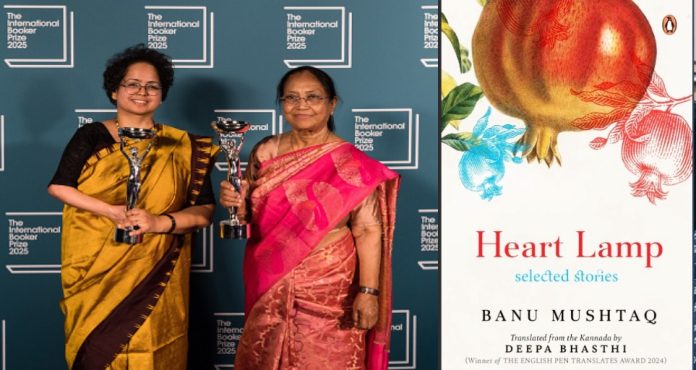– M Rafi Ahmed
“In a world that often tries to divide us, literature remains one of the last sacred spaces where we can live inside each other’s minds, if only for a few pages”, said septuagenarian Banu Mushtaq, a multifaceted personality as a women’s rights activist, writer, lawyer and a journalist from Hassan in Karnataka, after receiving the coveted International Booker Prize for her short story anthology titled “Heart Lamp”.
On cloud nine she is as she made heads turn to become the first Kannada author to win global recognition. Heartening to hear her saying at the glittering event – “This moment feels like a thousand fireflies lighting a single sky – brief, brilliant and utterly collective.”
As a firebrand Muslim writer, she brought to the fore the sufferings of women and girls mostly from patriarchal communities in the southern part of India through her 12 short stories penned between 1990 and 2023.
Thanks to Deepa Bhasthi from Kodagu in Karnataka, who translated the original work “Hridaya Deepa” from Kannada into English. Glad to witness both the author and the translator being honoured with the prestigious award in London. Moreover, the duo shared the prize money of GBP 50,000 (approximately Rs 57,50,000). Words cannot express the amount of happiness they had while receiving the award jointly.
According to the Booker Prize Foundation, Mushtaq is a prolific author with six short-story collections, a novel, an essay collection, and a volume of poetry to her credit. She is also the recipient of several notable literary accolades, including the Karnataka Sahitya Academy Award and the Dana Chintamani Attimabbe Award. Meanwhile, Deepa Bhasthi, a writer and literary translator has to her credit translated works of Kannada literary giants such as Kota Shivarama Karanth and Kodagina Gouramma.
Her skilful translation of ‘Heart Lamp’ was also recognised as a vital component in bringing Kannada literature to a broader audience. A quick glance of “Heart Lamp” revealed an alphabetic list of 3,339 people from her native whom the author had credited for being instrumental in bringing out the book while not to speak of her spouse Mustaq Mohiyuddin for his wholehearted support in her initiative. Not to be left behind, the writer’s collection reflects her enduring commitment to portray the miserable lives of women.
Adding a jewel in the crown of the author, Max Porter, Chair of the International Booker Prize 2025 jury had a word of praise on her attempt by stating that it was a unanimous favourite among the judges. “This was the book the judges really loved, right from our first reading. It’s been a joy to listen to the evolving appreciation of these stories from the different perspectives of the jury. We are thrilled to share this timely and exciting winner with readers around the world,” he noted.
In this backdrop, Karnataka Chief Minister Siddaramaiah felicitated Banu Mushtaq for her historic win. In his X post, he wrote, “Heartfelt congratulations to Kannada’s pride, author Banu Mushtaq, who has been awarded the International Booker Prize. This is a moment of celebration for Kannada, Kannadigas, and Karnataka.”
Likewise, he commended the translator, saying, “On behalf of all Kannadigas, I extend congratulations to the talented writer Deepa Bhasthi, who translated Banu Mushtaq’s Booker Prize-winning work Hridaya Deepa into English as Heart Lamp. I wish she continues to write and translate with strength and spirit, spreading the essence of Kannada across the world.”
Browsing her profile, it is learnt that Banu started writing while at school and continued her higher education, even as many of her peers got married and raised children. And it took several years before her work was published. Her first short story appeared in a local magazine when she was 27, a year after marrying a man of her choice at the age of 26. At 29, she was a mother grappling with postpartum depression. However, putting up a brave face, she faced the challenges to raise her voice for the cause of her clan. She even worked as a reporter for a tabloid for a brief period before switching to a career in law, supporting her family even while continuing to write.
Banu Mushtaq was closely associated with ‘Bandaya movement’, which used literature and activism to highlight social and economic injustices meted out to womenfolk. Notably, her writings published over four decades, have been translated into Urdu, Hindi, Tamil and Malayalam. In 2024, another translated volume, Haseena and Other Stories, won the PEN Translation Prize. While speaking to a BBC reporter, Banu said that free space for speech is shrinking across the globe which is a matter of grave concern. Perhaps, she is right as even there is hardly any freedom to pen one’s thoughts.
[The author is former Indian Express and Deccan Chronicle chief]




